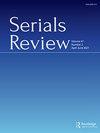可变因素对Clarivate Analytics牙科期刊影响因素的意义
IF 0.9
4区 管理学
Q3 INFORMATION SCIENCE & LIBRARY SCIENCE
引用次数: 0
摘要
摘要背景研究人员和院士在高影响因子(IF)期刊上发表文章的压力越来越大,这就需要在学术界选择有用的高质量期刊。目的探讨IF在口腔医学期刊中的作用及影响IF的因素,包括期刊的四分位数分布。方法对Clarivate Analytics所有口腔医学期刊(牙科、口腔外科和医学)的期刊编委会规模、期刊年龄、出版状态(印刷版或电子版)、出版频率、四分位数和5年IF进行调查。采用描述性和推断统计学。这些信息是从期刊的各个网站和科学网数据库中获得的。结果所有四个变量(编委会规模、出版频率、期刊状况和年龄)均与IF无关,基于所有四个因素的IF没有统计学显著差异。讨论对所有四个因素的研究有助于单个期刊的当前IF。具有四分位数排名的期刊的五年和年度进展趋势有助于为期刊选择做出学习选择。目前学术界对口腔保健专业人员的需求是选择高IF牙科期刊。无论影响因素如何,学术机构都可以采取出版和繁荣政策来促进写作文化。应向学术机构的教职员工提供激励措施,并应分配足够的时间来促进出版文化。应该鼓励新手作者开始写作,而不是一开始只关注高IF期刊,因为随着时间的推移,质量应该随之而来。如果文章发表在医学期刊上,关键词应包括牙科/或牙科,因此也可以在牙科文献中进行分类,只要适用。结论四个因素均无影响。较大的编委会规模和较高的每年出版频率与IF没有显著关联。IF与期刊地位和年龄的比较也表明与IF没有关联。任何特定期刊的选择都应基于当前的IF、期刊四分位数排名和期刊领域特异性。建议进一步研究接受率、开放获取、等待时间和成本对期刊选择的影响。本文章由计算机程序翻译,如有差异,请以英文原文为准。
Significance of Variable Contributing Factors on Impact Factor of Clarivate Analytics Dental Journals
Abstract Background Increasing pressure on researchers and academicians to publish in high impact factor (IF) journals necessitates selecting useful quality journals in academia. Objectives To review IF’s role and the factors that influence the IF of dental journals, including the journals’ quartile distribution. Methods The Editorial board size of the journal, age of the journal, status (print or electronic) of publication, frequency of publication, quartile, and 5-year IF of all Clarivate Analytics’ oral-dental journals (Dentistry, Oral Surgery, and Medicine) were investigated. Descriptive and inferential statistics were utilized. The information was obtained from individual websites of the journals and Web of Science databases. Results The result shows that all four variables (Editorial board size, frequency of publication, status, and age of journals) were not correlated with the IF, and there was no statistically significant difference found on the IF based on all four factors. Discussion Studies on all four factors contribute to the current IF of individual journals. Five-year and yearly progress trends of journals with quartile rankings are helping to make learning choices for journal selection. The selection of high IF dental journals is a current need for oral health care professionals from academia. Irrespective of the impact factors, publish and flourish policy may be adopted by academic institutions to promote a writing culture. Incentives should be offered to faculty of academic institutions, and adequate time should be allocated to promote publishing culture. Novice authors should be encouraged to start writing and not initially only focus on high IF journals, as with time, quality should follow. If articles are published in medical journals, the keywords should include dental/or dentistry, so it could be classified in the dental literature as well, wherever it is applicable. Conclusion There is no influence on any of the four factors. The larger Editorial board size and higher frequency of publications per year were not significantly associated with the IF. Comparison of IF with status and age of journals also showed no association with the IF. Any particular journal’s choice should be based upon the current IF, journal quartile ranking, and journal domain specificity. Further research on acceptance rate, open access, waiting time, and cost influencing journal selection is suggested.
求助全文
通过发布文献求助,成功后即可免费获取论文全文。
去求助
来源期刊

Serials Review
INFORMATION SCIENCE & LIBRARY SCIENCE-
CiteScore
1.60
自引率
11.10%
发文量
49
期刊介绍:
Serials Review, issued quarterly, is a peer-reviewed scholarly journal for the international serials community. Articles focus on serials in the broadest sense of the term and cover all aspects of serials information; regular columns feature interviews, exchanges on controversial topics, book reviews, and conference reports. The journal encompasses practical, theoretical, and visionary ideas for librarians, publishers, vendors, and anyone interested in the changing nature of serials. Serials Review covers all aspects of serials management: format considerations, publishing models, statistical studies, collection analysis, collaborative efforts, reference and access issues, cataloging and acquisitions, people who have shaped the serials community, and topical bibliographic studies.
 求助内容:
求助内容: 应助结果提醒方式:
应助结果提醒方式:


